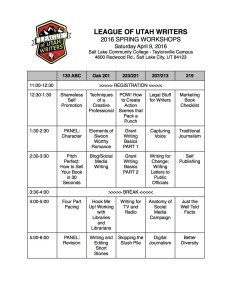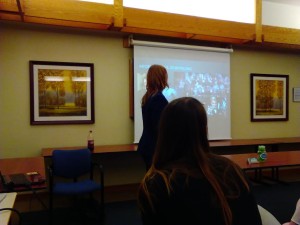League of Utah Writers Spring Conference
Posted by Rampant Coyote on April 11, 2016
 Over the weekend I attended the League of Utah Writers Spring Conference (Workshop) held in Taylorsville, Utah. My friend John Olsen went into more detail (and took way more pictures – my two didn’t turn out well), and has a write-up of his experiences here.
Over the weekend I attended the League of Utah Writers Spring Conference (Workshop) held in Taylorsville, Utah. My friend John Olsen went into more detail (and took way more pictures – my two didn’t turn out well), and has a write-up of his experiences here.
With so many different classes packed into a little under six hours, there were several classes I wanted to attend but couldn’t. But here’s a quick run-down of what I did see!
I started out by hitting Ali Cross’s class on writing action scenes. Her focus was mainly on fight scenes, but she did use a chase scene as an example. The bulk of the seminar was on keeping it real… or at least within the realm of believability. This covered a range of topics.
One suggestion: Don’t make your protagonist suddenly turn into a martial arts legend able to defeat trained special forces agents all of the sudden if that’s not their background. However, they can be given one good trick that they believably picked up from somewhere which allows them to fight back enough to escape. She used Melissa McCarthy’s character in Identity Thief as an example… I never saw the movie, but the character was good at punching people in the throat.
Another point was to keep things grounded, and remember the terrain and the character’s entire body. Even if it’s fighting a dragon. People need room to fight, and remember how much of their body needs to go into a move for it to be effective.
Finally, we discussed writing techniques, and how a lot of it depends on whether it’s a plot-focused action scene or a character-focused action scene. Plot-focused scenes tend to be more blow-by-blow, and character-focused tend to omit more of the details and focus on what’s going on inside the character’s head. Remember point-of-view, avoid passive voice, and try to keep the sentences quick and punchy. Another trick is to keep the verb and direct object as close to together as possible. An action scene that goes longer than a page will fatigue and bore the reader, and that’s a really, really bad thing in any scene, but especially an action scene.
 Next I attended editor Callie Stoker’s workshop on voice. She covered both character voice, and authorial voice. She started by having people describing Mr. Darcy, Harry Dresden, and Jay Gatsby’s big party… then read how they were introduced in the books. Interestingly enough (and I’d totally forgotten this), in The Great Gatsby it was almost entirely in the head of the narrator… how it all felt, rather than a physical description. She involved the audience for practice changing words in sentences to give them more of a “voice” – first character, then authorial, then transitioning between the two in the same sentence. It’s a tricky balancing act, and I thought the workshop was extremely useful. I also came to realize how much I suck at this.
Next I attended editor Callie Stoker’s workshop on voice. She covered both character voice, and authorial voice. She started by having people describing Mr. Darcy, Harry Dresden, and Jay Gatsby’s big party… then read how they were introduced in the books. Interestingly enough (and I’d totally forgotten this), in The Great Gatsby it was almost entirely in the head of the narrator… how it all felt, rather than a physical description. She involved the audience for practice changing words in sentences to give them more of a “voice” – first character, then authorial, then transitioning between the two in the same sentence. It’s a tricky balancing act, and I thought the workshop was extremely useful. I also came to realize how much I suck at this.
Lisa Mangum, author and editor for Shadow Mountain Publishing, ran a workshop on creating pitches for books… emphasizing the ability to sell a book in 30 seconds (or less). While that was the hook, the workshop was a bit more comprehensive than that, covering everything from composing tweet-sized pitches to writing a full synopsis for an editor. The idea was to use the smaller pitch to engage enough interest and attention to share the next bigger, more information-packed pitch. Some tidbits (especially when working with editors): Really know what genre and story type you are working with. While we may resent being put into those boxes, it’s a shorthand to communicates a lot of information in very few words. Another point she made is to think about our favorite book, and think about how we tell our friends about it. THAT is how we should talk to other people about our own books. That feeling, if not wording.
Michael Bacera’s session on creating a social media campaign was a LOT more useful and information-dense than I anticipated. John has some good stuff in his write-up on this one, but I seriously couldn’t keep up with the notetaking. His focus was on creating engaging content that invited action, rather that “trying to sell to your followers,” which doesn’t do so well and tends to piss off your audience, and creating a full-on campaign plan with measurable results.
Finally, Paul Genesse – always an entertaining speaker – talked about writing short stories. He spoke on the whys and the hows of writing short stories – with a lot of emphasis on the whys. Of course, the days are long past when an author could make a living writing short stories (not that it was ever super-lucrative). But there are still reasons to make short stories, not the least of which is that it allows authors to experiment, hone their craft, and get some ideas out there really quickly.
I felt the conference was valuable. My wife asked how it compared to LTUE a couple of months ago. LTUE definitely drew in the bigger names with more experience and more established credentials. However, a lot of the presenters at this conference. were the same people on panels at LTUE, but who now had the stage to themselves to get into a lot more details with a smaller crowd, rather than it being a survey of advice. There were panels as well, but I didn’t attend any. I think given my current experience level (still sucking but sucking a lot less than when I started), I am definitely in the position to learn a lot from both.
And now I totally want to see a similar, local conference focused on game development!
Filed Under: Books, Events - Comments: Comments are off for this article